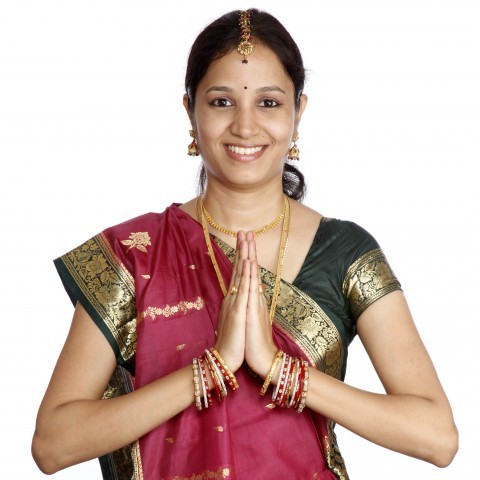
Did you read our extensive guide on “How to Say Hello in Hindi“? Then it’s time to take a step forward and learn how to say goodbye in Hindi. Because let’s face it: Nobody likes to leave a conversation abruptly. Knowing how to conclude a conversation is just as crucial as knowing how to start one! It’s part and parcel of a strong communication etiquette.
Here are just a few reasons you’ll want to learn how to say goodbye in Hindi:
- In India, you’ll need this knowledge at the end of the day.
- It’s the proper way to end a chat or meeting with someone.
- Leaving without saying bye is impolite and rude in any culture.
- More importantly, we have specific Indian gestures that go along with particular goodbye phrases. (Another great reason to join us in this lesson!)
In this guide, we’ll be looking at some formal and informal ways of seeing people off in various situations. Start with a bonus, and download the Must-Know Beginner Vocabulary PDF for FREE!(Logged-In Member Only)
 Table of Contents
Table of Contents
- Formal Ways to Say Goodbye
- Informal Ways to Say Goodbye
- When Texting / Talking Over the Phone
- Untranslatable Goodbye Phrases in Hindi
- Blessings From Elderly People
- Mastering Hindi Goodbyes with HindiPod101.com
1. Formal Ways to Say Goodbye

Let’s begin with the formal ways of saying goodbye in the Hindi language. There are several benefits of knowing how to use this kind of formal language in India, and these formal goodbye phrases are safe to use in any situation and with anybody. If it’s your first trip to India, you may want to read our article on the Do’s and Don’ts of Indian Etiquette.
| Gesture ⇒ | Join the palms of your hands, placed near your chest, while slightly bowing your head with a gentle smile on your face. | ||
| 1. | नमस्ते (NamaSTe) | [Formal & Casual] | “Goodbye!” |
| Example Situation | This Hindi word for goodbye can be used in any situation, whether formal or informal. Maybe you’ve met someone for the first time, and you’re getting ready to part ways. नमस्ते (NamaSTe) is the safest word to use, regardless of how old the other person is. | ||
| Sentence Usage[Male] | मैं दादाजी को आपका संदेश दे दूंगाI नमस्तेI (main DaaDaajii ko aap kaa SaNDes De Duungaa. NamaSTe.) | ||
| Sentence Usage[Female] | मैं दादाजी को आपका संदेश दे दूंगीI नमस्तेI (main DaaDaajii ko aap kaa SaNDes De Duungii. NamaSTe.) | ||
| English Translation | “I will pass on your message to my grandfather. Goodbye.” | ||
| Gesture ⇒ | Join the palms of your hands, placed near your chest, while slightly bowing your head with a gentle smile on your face. | ||
| 2. | शुभ रात्रि (subh raaTri) | [Formal] | “Goodnight” |
| Example Situation | This phrase is used at the end of the day. For instance, when leaving a dinner party and saying goodbye to the host. | ||
| Sentence Usage | पार्टी बहुत अच्छी थीI हमें बुलाने के लिए धन्यवादI शुभ रात्रिI (paartii bahuT acchii THii. hamen buLaaNe ke Liye DHaNyavaaD. subh raaTri.) | ||
| English Translation | “The party was amazing. Thank you for inviting us. Goodnight!” | ||

The Typical Indian Goodbye
| Gesture ⇒ | Join the palms of your hands, placed near your chest, while slightly bowing your head with a gentle smile on your face. | ||
| 3. | नमस्कार (NamaSkaar) | [Formal] | “Good day” |
| Example Situation | You could hear this being said on a news channel or in other highly formal situations, such as at a railway station or during a radio program. | ||
| Sentence Usage | ये थे आज के मुख्य समाचारI नमस्कारI (ye THe aaj ke mukhy Samaacaar. NamaSkaar.) | ||
| English Translation | “These were the main headlines for today. Good day.” | ||
| Gesture ⇒ | Join the palms of your hands, placed near your chest, while slightly bowing your head with a gentle smile on your face. | ||
| 4. | आपका दिन शुभ हो (aap kaa DiN subh ho) | [Formal] | “Have a good day.” |
| Example Situation | You could hear this being said on a news channel, any TV show, or in other highly formal situations, such as after a stewardess has given an announcement. | ||
| Sentence Usage | हमारे साथ यात्रा करने के लिए धन्यवादI आपका दिन शुभ होI (hamaare SaaTH yaaTraa karaNe ke Liye DHaNyavaaD. aap kaa DiN subh ho.) | ||
| English Translation | “Thank you for choosing to travel with us. Have a good day.” | ||
| 5. | आपसे मिलकर अच्छा लगा(aap Se miLakar acchaa Lagaa) | [Formal] | “It was nice meeting you.” |
| Example Situation | Of course, people say this to each other when they’ve met for the first time. This Hindi goodbye phrase could be used between two relatives, professionals, potential friends, etc. | ||
| Sentence Usage | उम्मीद है फिर मुलाक़ात होगी। आपसे मिलकर अच्छा लगा। (ummiiD hai phir muLaaqaaT hogii. aap Se miLakar acchaa Lagaa.) | ||
| English Translation | “Hope we see each other again. It was nice meeting you.” | ||
Quick Note: Leave a stunning impression by introducing yourself with one of these top ten Hindi ice-breakers!
2. Informal Ways to Say Goodbye
Now that we’ve covered the must-know formal phrases, here comes the most exciting part for the youngsters. In this section, we’ll talk about how to say goodbye in Hindi when the environment is more laid-back.
| Gesture ⇒ | You may simply wave your hand if you’re parting ways with someone of the opposite sex, while people of the same sex may go for a quick handshake. | ||
| 6. | मिलते हैं किसी दिन(miLaTe hain kiSii DiN) | [Casual] | “Let’s meet up someday!” |
| Example Situation | When two people happen to run into each other, they may say “Hi” and use this phrase to end their short but pleasant conversation (assuming they would really like to see one another again). | ||
| Sentence Usage | और क्या हाल हैं? मिलते हैं किसी दिन! (aur kyaa haaL hain? miLaTe hain kiSii DiN.) | ||
| English Translation | “And what’s new? Let’s meet up someday!” | ||

Saying Bye to Colleagues
| Gesture ⇒ | Friendly eye-contact and a smile will do the job. | ||
| 7. | कल मिलते हैं(kaL miLaTe hain) | [Casual] | “See you tomorrow.” |
| Example Situation | When you see your friend or colleague on a regular basis, it makes sense to plan something for the next day, and that’s where this phrase comes in. | ||
| Sentence Usage | कल मिलते हैं, उसी जगह उसी वक़्त। (kaL miLaTe hain, uSii jagah uSii vaqT.) | ||
| English Translation | “See you tomorrow, same place same time.” | ||
| Gesture ⇒ | You may simply wave your hand if you’re parting ways with someone of the opposite sex, while people of the same sex may go for a quick handshake. | ||
| 8. | मिलते रहना(miLaTe rahaNaa) | [Casual] | “Keep in touch.” |
| Example Situation | Two friends see each other after a long while, either by chance or through a planned meeting. In this situation, this phrase is the perfect way to say goodbye in the Hindi language. It implies that they would really like to see each other more in the future. | ||
| Sentence Usage[Male] | अरे! बहुत दिन बाद दिखे। कैसे हो? मिलते रहना। (are! bahuT DiN baaD Dikhe. kaiSe ho? miLaTe rahaNaa.) | ||
| Sentence Usage[Female] | अरे! बहुत दिन बाद दिखीं। कैसी हो? मिलती रहना। (are! bahuT DiN baaD Dikhiin. kaiSii ho? miLaTii rahaNaa.) | ||
| English Translation | “Oh! Long time no see. How are you? Keep in touch.” | ||
| Gesture ⇒ | You may simply wave your hand if you’re parting ways with someone of the opposite sex, while people of the same sex may go for a quick handshake. | ||
| 9. | जल्दी मिलेंगे(jaLDii miLenge) | [Casual] | “See you soon.” |
| Example Situation | This phrase is often used when two friends or colleagues are parting ways and hope to meet soon. | ||
| Sentence Usage | आज की शाम आपके साथ काफ़ी अच्छी रही। उम्मीद है हम फिर जल्दी मिलेंगे। (aaj kii saam aap ke SaaTH kaafii acchii rahii. ummiiD hai ham phir jaLDii miLenge.) | ||
| English Translation | “I really enjoyed this evening with you. Hope to see you soon.” | ||

Proper Phone Etiquette
| Gesture ⇒ | Friends may offer each other a handshake or a tap on the shoulder. However, physical touching between opposite genders must be avoided in public places. Elders may caress a young person’s hair or cheeks to show their affection. | ||
| 10. | ध्यान रखना (DHyaaN rakhaNaa) | [Casual] | “Take care.” |
| Example Situation | When seeing someone off at an airport or train station, loved ones say this to each other. | ||
| Sentence Usage | किसी बात की चिंता मत करना और अपना ध्यान रखना। (kiSii baaT kii ciNTaa maT karaNaa aur apaNaa DHyaaN rakhaNaa.) | ||
| English Translation | “Don’t worry about anything and take care.” | ||
| Gesture ⇒ | You may simply wave your hand if you’re parting ways with someone of the opposite sex, while people of the same sex may go for a quick handshake. | ||
| 11. | चलता / चलती हूँ (caLaTaa) / (caLaTii huun) | [Casual] | “Gotta go.”Or”I’ve got to take off.” |
| Example Situation | Suppose there are classmates enjoying some snacks together in the college cafeteria. One of them realizes that he or she needs to leave early, so they say this phrase to their classmates. | ||
| Sentence Usage[Male] | चलता हूँ। मुझे कल के एग्ज़ाम के लिए तैयारी भी करनी है।(caLaTaa huun. mujhe kaL ke egzaam ke Liye Taiyaarii bhii karaNii hai.) | ||
| Sentence Usage[Female] | चलती हूँ। मुझे कल के एग्ज़ाम के लिए तैयारी भी करनी है। (caLaTii huun. mujhe kaL ke egzaam ke Liye Taiyaarii bhii karaNii hai.) | ||
| English Translation | “Gotta go! I’ve got to prepare for tomorrow’s exam, too.” | ||
| Gesture ⇒ | Friendly eye-contact and a smile will do the job. | ||
| 12. | जाने का समय हो गया है (jaaNe kaa Samay ho gayaa hai) | [Casual] | “It’s time to go.” |
| Example Situation | You can use this phrase in a variety of situations, such as when the train has arrived and you have to say bye to your loved ones. It’s basically a conversational phrase that’s a bit time-sensitive. | ||
| Sentence Usage | जाने का समय हो गया है। चलो, सबके पैर छू लें। (jaaNe kaa Samay ho gayaa hai. caLo, Sab ke pair chuu Len.) | ||
| English Translation | “It’s time to go. Let’s touch everybody’s feet.” | ||
Quick Note: In India, young people usually follow the custom of touching their elders’ feet before leaving. In response to that, the elders put their palm on the young people’s heads to show their affection and bless them.

See You Soon! 🙂
| Gesture ⇒ | Friendly eye-contact and a smile will do the job. | ||
| 13. | अब हमें चलना चाहिए (ab hamen caLaNaa caahiye) | [Casual] | “We should leave now.” |
| Example Situation | Attending an office party, but think it’s getting too late already? Use this phrase to politely express your desire to leave for home. | ||
| Sentence Usage | काफ़ी रात हो गई हैI अब हमें चलना चाहिएI (kaafii raaT ho gayii hai. ab hamen caLaNaa caahiye.) | ||
| English Translation | “It’s actually quite late. We should leave now.” | ||
3. When Texting / Talking Over the Phone
Telephonic conversation etiquette has a style of its own. People use a completely different set of phrases to talk over the phone. Let’s check out some of the most common ways to say “Bye for now” in Hindi after a chat on the phone.
| Gesture ⇒ | Don’t forget to smile, because people can sense it even when they can’t see you! | ||
| 14. | फ़ोन करते रहना (foN karaTe rahaNaa) | [Casual] | “Call me.” / “Keep in touch.” |
| Example Situation | Friends or parents may use this phrase over the phone when talking to their friend or child who’s just moved to a new city. | ||
| Sentence Usage | दिल्ली के नए माहौल का लुत्फ़ उठाओI और फ़ोन करते रहनाI (DiLLii ke Naye maahauL kaa LuTf uthaao. aur foN karaTe rahaNaa.) | ||
| English Translation | “Enjoy your new life in Delhi. And keep in touch.” | ||
| Gesture ⇒ | Keep a gentle tone and don’t forget to smile, because people can sense it even when they can’t see you! | ||
| 15. | बाद में बात करते हैं (baaD men baaT karaTe hain) | [Casual] | “Talk to you later.” |
| Example Situation | You know that feeling when you just don’t want to put the phone down, but you have to? Indians use this phrase as a gesture to express that they’re very much looking forward to having another lovely chat with you soon! | ||
| Sentence Usage | चलो, अभी तुम सो जाओI बाद में बात करते हैंI (caLo, abhii Tum So jaao. baaD men baaT karaTe hain.) | ||
| English Translation | “Alright, you get some rest now. Talk to you later.” | ||

Have a Great Day!
4. Untranslatable Goodbye Phrases in Hindi
Now for a really unique section! Here are a couple of untranslatable Hindi phrases that have no substitute in English or any other language.
| Gesture ⇒ | You can wave, make friendly eye contact, and smile. | ||
| 16. | अलविदा (aLaviDaa) | [Casual] | “Goodbye!” |
| Example Situation | This is an Urdu word with roots in the Arabic language. But it can be heard quite frequently in Bollywood movies portraying Muslim characters. It’s mainly said when two people don’t know when they’ll meet again and wish for each other’s well-being. | ||
| Sentence Usage | अलविदा, चचा जानI हम हमेशा आपको याद करेंगेI (aLaviDaa, cacaa jaaN. ham hamesaa aap ko yaaD karenge.) | ||
| English Translation | “Goodbye, dear uncle. We’ll always miss you.” | ||
| Gesture ⇒ | You can wave, make friendly eye contact, and smile. | ||
| 17. | टाटा (taataa) | [Casual] | “Bye!” |
| Example Situation | When the mood is light, this should be your go-to Hindi goodbye phrase. It’s especially popular among kids, because it’s so easy to say with few syllables. In addition, family members will often say this to each other when parting ways. | ||
| Sentence Usage | टाटा! घर पहुँच कर फ़ोन ज़रूर करनाI (taataa, ghar pahunc kar foN zaruur karaNaa.) | ||
| English Translation | “Tata! Make sure to call me once you get home.” | ||
5. Blessings From Elderly People
In India, we have a custom of touching the feet of our elders, especially while greeting them and saying goodbye. Touching the feet is a gesture that represents our love and deep respect toward older people. To this, our elders respond by placing their palm on our head and blessing us. Below are some popular phrases used for this purpose.
| Gesture ⇒ | After a young person has touched an elder’s feet, the elder will put their palm on the young person’s head to show their affection and bless them. | ||
| 18. | सदा सुखी रहो (SaDaa Sukhii raho) | [Out of Love] | “Wish you forever happiness.” |
| Example Situation | Old people usually say this as a blessing to married couples. | ||
| Sentence Usage | सदा सुखी रहोI (SaDaa Sukhii raho) | ||
| English Translation | “Wish you forever happiness.” | ||
| Gesture ⇒ | After a young person has touched an elder’s feet, the elder will put their palm on the young person’s head to show their affection and bless them. | ||
| 19. | ख़ूब नाम कमाओ (khuub Naam kamaao) | [Out of Love] | “May you achieve success.” |
| Example Situation | This is a more generic blessing from elders to young people. | ||
| Sentence Usage | मन लगाकर पढ़ाई करो और ख़ूब नाम कमाओI (maN Lagaakar padhhaaii karo aur khuub Naam kamaao.) | ||
| English Translation | “Study with full dedication and may you achieve success.” | ||
| Gesture ⇒ | After a young person has touched an elder’s feet, the elder will put their palm on the young person’s head to show their affection and bless them. | ||
| 20. | आयुष्मान भव (aayusmaaN bhav) | [Out of Love] | “Live long.” |
| Example Situation | This is another generic blessing, and it means: “May you live long.” | ||
| Sentence Usage | आयुष्मान भवI (aayusmaaN bhav.) | ||
| English Translation | “May you live long.” | ||

It was a Pleasure Meeting You!
6. Mastering Hindi Goodbyes with HindiPod101.com
And now, it’s really time for us to say goodbye! Jokes aside, which of the phrases in this article is your favorite? Can you use it in a sentence and share it with us in the comments? Oh, and feel free to drop any questions you have there, too. We’d love to help!
But before that, how about signing up on HindiPod101.com and downloading our latest innovative app. And if there’s any word or phrase in this lesson that is difficult for you to understand, you can check its meaning in our Grammar Bank.
For more fun learning, stay tuned guys, ‘cause we have so much in store for you!










